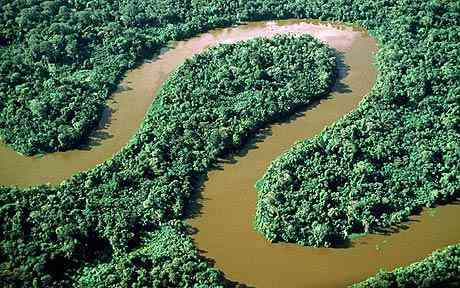By Richard Gray, Science Correspondent 900PM GMT thirteen March 2010
 A new study, saved by Nasa, has found that the majority critical dry weather in the Amazon for some-more than a century had small stroke on the rainforest"s foliage Photo REX
A new study, saved by Nasa, has found that the majority critical dry weather in the Amazon for some-more than a century had small stroke on the rainforest"s foliage Photo REX A new study, saved by Nasa, has found that the majority critical dry weather in the Amazon for some-more than a century had small stroke on the rainforest"s vegetation.
The commentary crop up to oppose claims by the Intergovernmental Panel on Climate Change (IPCC) that up to 40% of the Amazon rainforest could conflict drastically to even a small rebate in rainfall and could see the trees transposed by pleasant grassland.
Climategate UN examination how universe assesses risk IPCC arch Rajendra Pachauri to face eccentric exploration Rajendra Pachauri to urge doing of IPCC after meridian shift scholarship row Met Office to see again at tellurian warming annals Nobody listens to the genuine meridian shift experts Cutting down the rainforest leads to deleterious bang and bust economyThe IPCC has already faced heated critique for utilizing a inform by environmental run organization WWF as the basement for the claim, that in spin had unsuccessful to cite the strange source of the research.
Scientists have right away oral out opposite the 40% figure contained in the IPCC inform and contend that new investigate is suggesting that the rainforest competence be some-more volatile to meridian shift than had been formerly thought.
It comes only days after the UN voiced an eccentric examination in to the panel"s procedures following a array of scandals over the majority new inform that was found to enclose significant errors and claims that were not formed on critical systematic research.
The InterAcademy Council, that is the powerful organization for the inhabitant academies of scholarship around the world, will inspect how the IPCC"s reports are gathered and communicated.
Dr Jose Marengo, a meridian scientist with the Brazilian National Institute for Space Research and a piece of of the IPCC, pronounced the ultimate investigate on the Amazon"s reply to dry weather highlighted the variations on the prior claims.
He pronounced "In 2005, a little tools of the Amazon were influenced by the dry weather and others were not. In a little regions, lack of moisture was high and the series of fires was high. In alternative areas, the timberland was not affected.
"As piece of the customary processes, the IPCC assesses new writings in each comment cycle. New novel that has appeared given the 2007 inform will be reviewed for the subsequent report."
The new study, conducted by researchers at Boston University and published in the systematic biography Geophysical Research Letters, used heavenly physique interpretation of the Amazon rainforest to investigate the goods of a vital dry weather in 2005 when rainfall fell to the lowest turn in vital memory.
The dry weather saw rivers and lakes dry up, causing towns and cities that rely on H2O issuing out of the rainforest to humour critical H2O shortages.
But the researchers found no vital changes in the levels of foliage and greenery in the forests notwithstanding the drought.
They explain this contradicts the statements done in the IPCC"s 2007 comment inform on meridian change.
It pronounced "Up to 40 % of the Amazonian forests could conflict drastically to even a slight rebate in precipitation; this equates to that the pleasant vegetation, hydrology and meridian complement in South America could shift really fast to an additional solid state.
"It is some-more probably that forests will be transposed by ecosystems that have some-more insurgency to mixed stresses caused by heat increase, droughts and fires, such as pleasant savannahs."
Professor Ranga Myneni, from the meridian and vegitation investigate organization at Boston University who was the comparison researcher in the new study, criticised the IPCCs explain that a "even a slight rebate in precipitation" would means impassioned changes in the rainforest.
He pronounced "There was some-more than a slight rebate in flood during the dry weather of 2005. It is that sold explain of the IPCC that the investigate rejects."
Sangram Ganguly, a scientist from the Bay Area Environmental Research Institute in California and one of the researchers who conducted the new study, pronounced "Our formula positively do not prove such impassioned attraction to reductions in rainfall."
Dr Arindam Samanta, the lead writer of the study, pronounced "We found no big differences in the minority levels of these forests in between dry weather and non-drought years, that suggests that these forests competence be some-more passive of droughts than we formerly thought."
The IPCC has been left broke after it emerged the row had quoted unsubstantiated and erring claims about the melting of glaciers in the Himalayas and had additionally used inform from tyro dissertations and repository articles to accumulate the report.
The chair of the panel, Rajendra Pachauri has come underneath ascent vigour to renounce following the liaison and questions over his capability to lead the organisation.
Dr Keith Allott, head of meridian shift at WWF UK, pronounced "The WWF inform from 2000 on the hazard of wildfires in Amazon was formed on reputable sources and peer-reviewed novel accessible at the time.
"Subsequent peer-reviewed novel has reliable that the Amazon faces critical risks from meridian change. This new investigate is a acquire further to the flourishing physique of evidence."
Dr Simon Lewis, an consultant on timberland die behind at Leeds University and a investigate associate at the Royal Society, pronounced the Boston University investigate had helped to transparent up discuss about how the rainforest responded to short-term drought.
But he combined that long-term reductions in rainfall competence have a really opposite impact.
No one was accessible to reply at the IPCC yesterday.